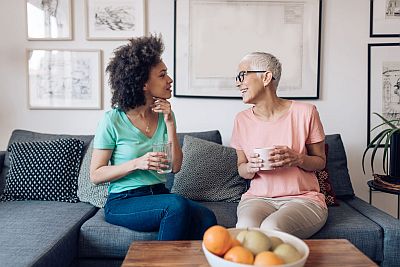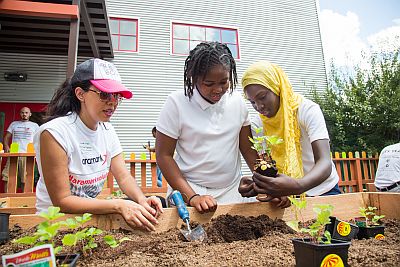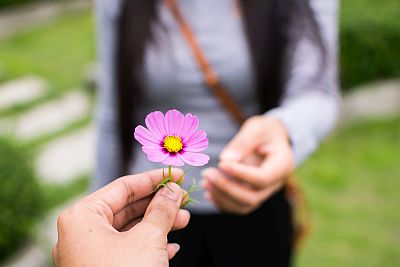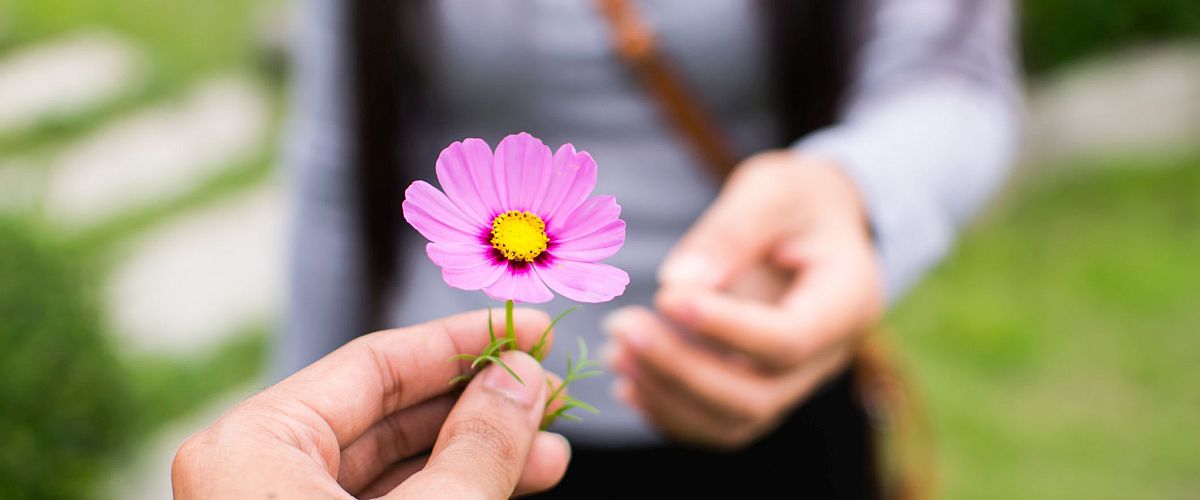Contemplate the word “kindness” and let it settle in for a moment. Wrap it around yourself like a blanket warm from the dryer. Without question, it’s an engulfing sensation, one that feels as right when offered as it does when it is received.
But every act of kindness we extend—to a fellow human being, to animals, to a cause near and dear to our hearts—offers benefits that go way beyond a momentary mood boost or a split-second smile. Each act of kindness seeps deeply into our bodies and has a real physical and emotional benefit.
In other words, kindess is healthy. Its benefits are rather astounding. And that is leading researchers to keep uncovering ways kindness is good for us.
For instance, volunteering (a major way to demonstrate kindness) has been shown to keep people active and socially connected—two ingredients to long and healthy lives.
Backed by Research
 According to a study published in The BMJ, the peer-reviewed journal of the British Medical Association, volunteering ties in with a 24% reduction in early death, which is comparable to eating four to six servings of fruits and vegetables every day.
According to a study published in The BMJ, the peer-reviewed journal of the British Medical Association, volunteering ties in with a 24% reduction in early death, which is comparable to eating four to six servings of fruits and vegetables every day.
“There’s so much research about how kindness affects us physiologically and in so many other ways,” says Brooke Jones, Vice President, Random Acts of Kindness Foundation, which sponsors Random Acts of Kindness Day February 17 each year.
Brooke references a study done at the University of British Columbia. Its aim was to determine how kindness affects levels of cortisol, the primary hormone that our bodies release in times of stress.
Volunteers in the study were instructed to perform one act of kindness every day for six weeks.
“Researchers noticed a significant decrease in cortisol levels over that six-week period,” she says. “The volunteers’ stress levels went down. Nothing else had changed except they were doing something kind every day.”
A similar study at the University of California, Riverside, asked volunteers to perform simple acts of kindness, such as paying for a stranger’s coffee. The result? A lower activity level of a type of gene in our bodies related to inflammation, which in turn has been linked to such health issues as cancer, arthritis, diabetes, and heart disease.
Studies like this are telling as well as encouraging.
“People see that being kind is not just nice work and simple moments,” Brooke says. “Kindness can change people’s lives and help improve their lives in moments when they’re most fragile.”
The Benefits
 Here are some of the physiological perks that happen when you hold open a door for someone, buy coffee for the person behind you in line, smile at a stranger, volunteer at an animal shelter, call loved ones on their birthday, take a new coworker to lunch—or do any number of seemingly simple acts of kindness whose consequences are far-reaching.
Here are some of the physiological perks that happen when you hold open a door for someone, buy coffee for the person behind you in line, smile at a stranger, volunteer at an animal shelter, call loved ones on their birthday, take a new coworker to lunch—or do any number of seemingly simple acts of kindness whose consequences are far-reaching.
Happier Heart
Showing compassion or even witnessing it releases oxytocin, which is the hormone connected to love. Oxytocin forms social bonds, which helps us better trust people and helps lower blood pressure, which over time can lead to a healthier heart.
More Warm-Fuzzies
In addition to releasing oxytocin, being kind also increases the release of such hormones as serotonin and dopamine. These chemicals give us the feeling of contentment, of satisfaction, of comfort—which is what some medications prescribed for depression do. By being kind, Psychology Today reports, you’re changing your brain “in ways that make you feel better.”
Boosted Immune System
According to research conducted by Sonja Lyubomirsky, psychologist at the University of California, Riverside, doing acts of kindness for others (rather than for ourselves or the world in general) leads to cellular changes related to disease resistance. Find more ways to strengthen your immunity.
Stress Reduction
 Being constantly in a mode of stress, which so many people are, sets us up for all sorts of illnesses and negative health outcomes. But simply acting with “compassionate intention has a huge positive effect on [one’s] physiology,” according to James Doty, MD, founder and director of the Center for Compassion and Altruism Research and Education (CCARE) at Stanford University.
Being constantly in a mode of stress, which so many people are, sets us up for all sorts of illnesses and negative health outcomes. But simply acting with “compassionate intention has a huge positive effect on [one’s] physiology,” according to James Doty, MD, founder and director of the Center for Compassion and Altruism Research and Education (CCARE) at Stanford University.
Showing kindness can take us out of that “fight or flight” mode,” he says, and put us into the “rest and digest” mode.
Talking about health benefits brings up one caveat: The health benefits of kindness, however significant and strong, should not be overpromised.
“I always start talks to groups by saying, ‘As the vice president of the Random Acts of Kindness Foundation, I’m not the kind of person you’d expect I would be. I have bad days. I have bad hours. I don’t suggest someone be overly kind all the time,’” Brooke says. “We are all human beings, and we are still competitive, still judgmental. These things won’t go away with moments of kindness.”
But, she says, infusing more moments of kindness into our lives and being more intentional helps us be less upset when life doesn’t go our way. We can instead be more flexible and more accepting of other people.
Key Principles of Kindness
 With that in mind, here are tidbits to keep in mind about kindness. Although some studies have found that kindness is innate, by being purposefully kind to others, you’re being kind to yourself—and helping to realize all the potential benefits to your own health.
With that in mind, here are tidbits to keep in mind about kindness. Although some studies have found that kindness is innate, by being purposefully kind to others, you’re being kind to yourself—and helping to realize all the potential benefits to your own health.
Kindness Surrounds Us
So try to be especially aware of it, because just seeing kindness is good for us. When we see a total stranger in the grocery store reach for a product another shopper isn’t tall enough to get, how can we help but smile? Plus, our bodies are releasing that feel-good hormone, oxytocin, reports the Random Acts of Kindness Foundation. “Anybody who witnesses kindness has the same positive physiological reactions as those who are part of extending that kindness,” Brooke says. “I love that.”
Kindness Is Contagious
“Mirror neurons mean that we mirror what others are feeling or doing,” Brooke says, “positive or negative.” Thus, seeing a kindness performed, we’re more likely to do one, too. She loves the beauty of the kindness domino effect: One good deed begets another.
Intentional Acts Can Lead to Random Acts
Intentional, Brooke says, might mean setting a kindness goal for yourself: “I’m going to let fellow drivers get in front of me on the freeway today.” Follow such intentions long enough, and they become second nature. “They become so embedded in our daily life,” she says, “you might not even think of it as a kindness.”
Kindness Is Its Own Reward
Sure, hearing “thank you” after performing a kind act is nice, Brooke says. Yet a major key of kindness is just practicing kindness for its own sake and not expecting something in return.
Ways to Practice Kindness

Get more ideas from the Random Acts of Kindness Foundation
So where to start? The suggestions below can get you going. Keep in mind, as mentioned earlier, that kindness begets kindness. One of these may lead to another and to another still, helping your health and bettering the lives of those around you.
Brooke suggests naming activities that you do every day, then assigning a kindness to each. For instance, if you name your activity “wake up,” you could make a point to send a thoughtful or funny text to a loved one before your feet even hit the floor. Or for “eat breakfast,” choose healthy foods, thus being kind to yourself.
We like to think of this as another great way to TAKE15 minutes for kindness breaks throughout your day for your emotional wellbeing. Here are a few ways to TAKE15 for kindness.
Write a Letter to Someone Who Has Impacted Your Life
Put it in an envelope, stamp it, mail it. Just imagine how you’d feel to receive such a note.
Express Gratitude
To your server, your sister, the stranger who lets you go first in the 10-items-or-less line (especially when you know you have 17 in your cart!) They’ll feel good; you’ll feel good. Read more about practicing gratitude.
Give a Neighbor Freshly Baked Banana Bread
Or leave some for the delivery people who bring your much-anticipated packages, even on days you have no intention of setting foot outside.
Catch Someone Off-Guard
Tell people in your exercise class or the swimming pool how much they inspire you to show up every day. Call someone you haven’t seen in forever just to say hello.
“Kindness won’t solve all the big problems,” Brooke says. “It’s not a health panacea, but the kinder as a society we become over time, the more problems will be solved.”
Note: Since everyone’s health history and nutritional needs are so different, please make sure that you talk with your doctor and a registered dietitian to get advice about the diet and exercise plan that‘s right for you.

